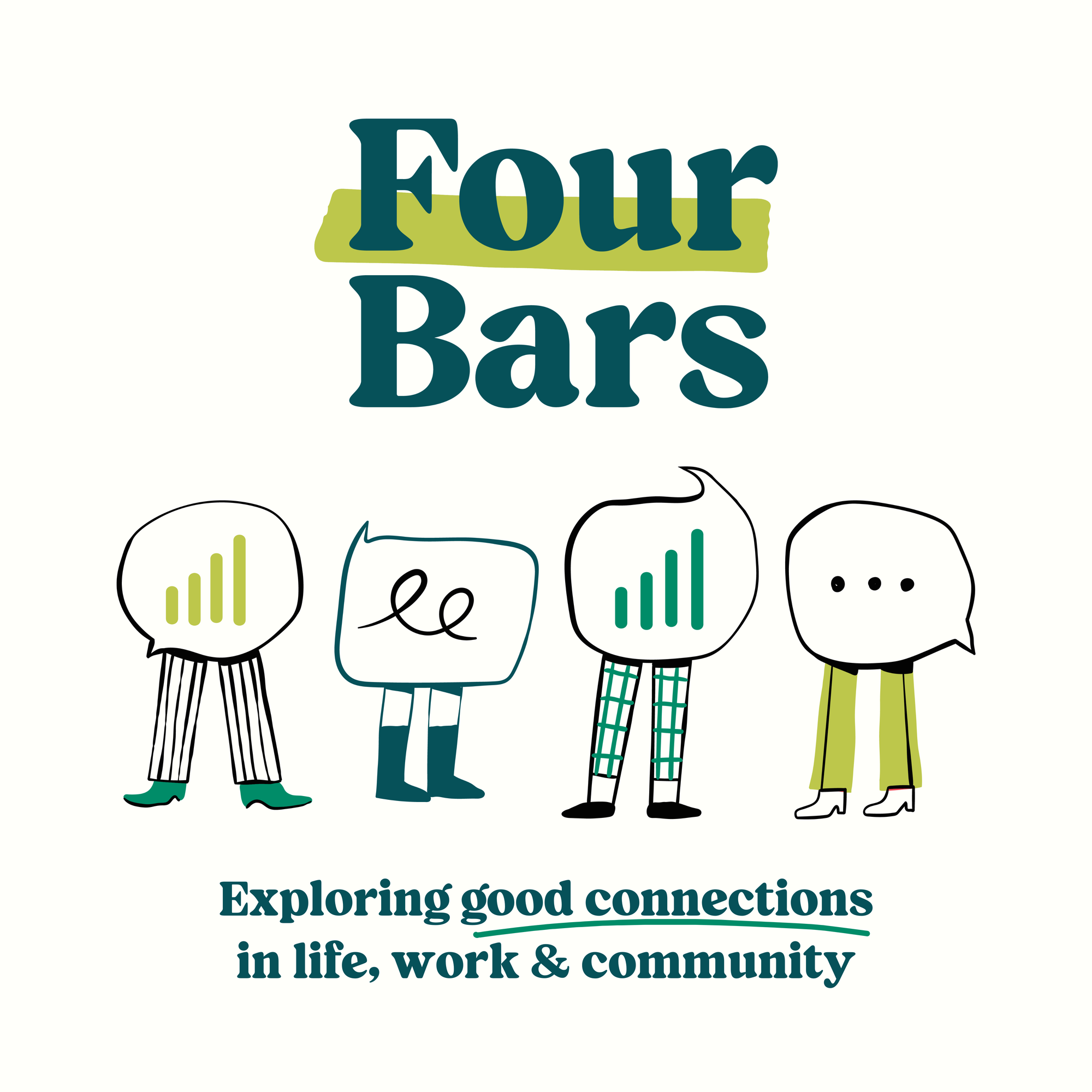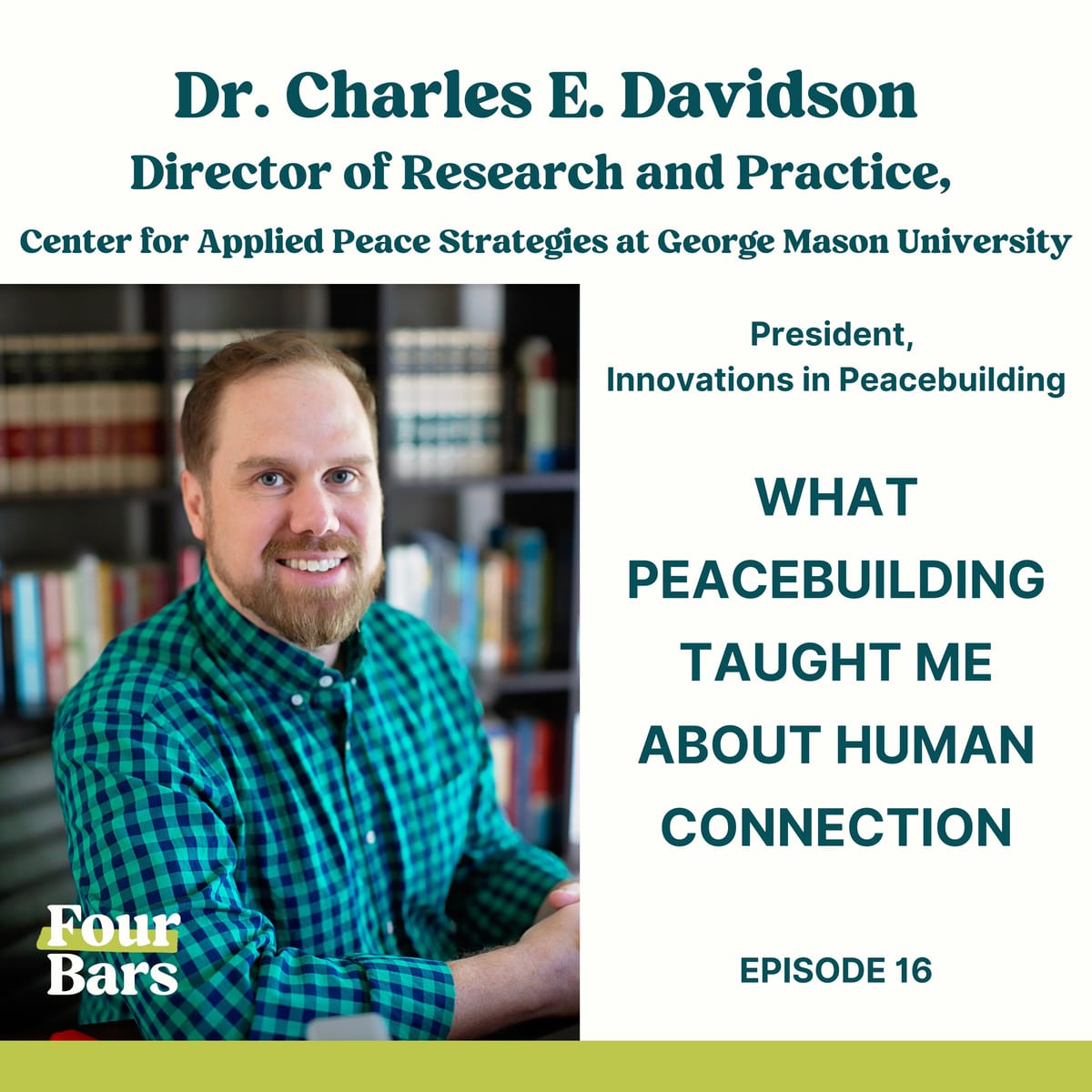From a mud-stuck vehicle in the Democratic Republic of Congo to the halls of George Mason University, Dr. Charles Davidson's journey in peace-building offers profound insights into human connection across seemingly insurmountable divides. As both Director of Research and Practice at the Center for Applied Peace Strategies and President of Innovations in Peacebuilding, Davidson brings decades of on-the-ground experience working directly with former child soldiers and armed groups in some of the world's most dangerous conflict zones.
Davidson's approach to peacebuilding turns conventional wisdom on its head. Rather than operating from fortified compounds or implementing preconceived solutions, he advocates for deep listening, local ownership, and economic opportunity as pathways to sustainable peace. His work demonstrates that whether you're negotiating with armed groups in Africa or managing office conflicts in America, the fundamental principles remain the same: recognize our shared humanity, listen before formulating solutions, and understand the legitimate needs driving seemingly destructive behaviors.
One story particularly illuminates Davidson's impact – a young Congolese woman rescued from forced marriage in an armed group who, with just two pregnant goats as startup capital, built a thriving business and opened a sewing school for other vulnerable women. She even became the organization's first African donor, gifting two goats to another survivor. This powerful transformation underscores Davidson's belief that providing economic alternatives and respect-building opportunities creates sustainable peace dividends far more effectively than traditional intervention methods.
Davidson challenges us all to be peacebuilders in our everyday lives, emphasizing that personal transformation precedes societal change. By examining our own biases, practicing deep listening, and seeking to understand the legitimate needs driving others' actions, we can contribute to peace regardless of our profession. Whether you're fascinated by international relations, conflict resolution in your workplace, or personal growth, this conversation offers practical wisdom for building stronger connections across our increasingly divided world. Follow Dr. Davidson's work, get involved, or simply apply his insights to your daily interactions—peace building begins with each of us.
Follow and stay connected:
Website: fourbarspodcast.com
YouTube: youtube.com/@FourBarsPodcast
Instagram: @edges_Inc
Facebook: EDGES Inc.
LinkedIn: EDGES Inc.
Never miss an update—follow, subscribe, and join the conversation!
More About this Episode
Why Peacebuilding Begins With Listening: Insights from the Front Lines with Dr. Charles Davidson
What does it mean to be a peacebuilder in a fractured world? This is more than just a question of global diplomacy - it's a challenge that touches workplaces, homes, and communities around the world. In this compelling conversation with Dr. Charles Davidson, we uncovered powerful truths about conflict, connection, and the quiet power of human dignity.
Charles isn’t just an academic or strategist. He’s someone who has slept on concrete floors under mosquito nets in war-torn countries, not to "rescue" but to listen - to truly hear people, especially those we might otherwise overlook. As the Director of Research and Practice at the Center for Applied Peace Strategies at George Mason University and founder of Innovations in Peacebuilding, Charles carries a resume filled with global credentials, but it's his grounded, human-first philosophy that defines his work.
From a Bolivian Prison to a Life of Purpose
Charles’ journey into peacebuilding began in a place most would never imagine: a prison in Bolivia. There, children lived inside with their incarcerated parents, and a young Charles had a revelation - these children were literally paying the price for the actions of adults. That visceral realization sparked something he couldn’t ignore.
What followed was a decade-long odyssey of learning and listening, not from textbooks, but directly from local peacebuilders in conflict zones across Africa, Asia, and the Middle East. From waiting tables to fund travel, to sleeping in bunk beds and on concrete floors, Charles built a career not by demanding a seat at the table, but by humbly offering to sit on the floor.
The Fundamental Truth: Peacebuilding Is Universal
One of Charles’ most striking insights is that the core principles of peacebuilding don’t change based on geography. Whether you're navigating the streets of Memphis, Tennessee, or a village in the Democratic Republic of Congo, the work of peace starts with one universal truth: we are all human.
Conflict resolution, he insists, requires empathy - not sympathy, not saviorism, but a genuine attempt to understand what others are experiencing. Before taking action, peacebuilders must listen deeply, think carefully, act thoughtfully, and reflect honestly. It's a cycle - listen, think, act, reflect - that may be exhausting, but it's essential.
And it's not exclusive to war zones. “There's nothing I do in the DRC that you can't do in Northwest Arkansas,” Charles noted. Peace begins in our own homes, workplaces, and communities. It's as much about personal introspection as it is global outreach.
The Power of Local Ownership
Charles is quick to point out that successful peace efforts don’t come from outsiders with checkbooks or master plans. They come from local people leading local solutions. Outsiders, he believes, should play a facilitative role - providing tools, frameworks, and support - not control.
One story that underscores this point involves a young Congolese girl taken into the armed groups in the DRC. After she was rescued through Charles’ organization and given just two pregnant goats, she didn’t just rebuild her life - she transformed her village. She became a seamstress, started a business, mentored other young women, and eventually became a donor to the very organization that had helped her.
This wasn’t a story of aid. It was a story of agency.
Economic Opportunity as a Peace Strategy
When asked what turns a child into a soldier, Charles doesn’t point to ideology. He points to hunger, to hopelessness, and most of all, to a lack of access to respectable pathways to adulthood. In conflict zones - and in underserved communities around the globe - youth often face a moment where they realize that the "cards they’ve been dealt" won't get them where they need to go.
That’s when violence starts to look like an option.
“You can find respect and sustainability at the other end of this AK-47,” he says, echoing the dangerous promises made by armed groups. But if peacebuilders can provide viable alternatives - like vocational training or micro-enterprise support - the equation changes. And it doesn't take much. Charles has seen young people turn their lives around for a couple hundred dollars and a chance to become a barber or a seamstress.
The Myth of the “Evil Other”
A recurring theme in our conversation was the moral lens through which we view others. Drawing from Augustine’s philosophy of “the good,” Charles challenged us to reconsider how we judge the actions of others. Even those who commit seemingly senseless acts may be seeking connection, purpose, or belonging - basic human needs that manifest in harmful ways when unfulfilled.
This doesn’t excuse violence, but it reframes it. And in doing so, it creates a new foundation for dialogue.
So How Can You Become a Peacebuilder?
Charles left us - and now you, our readers - with a simple but powerful call to action:
Be peaceful before you try to build peace.
If you're interested in making a difference, start by becoming someone whose presence calms the room. Practice listening - not just hearing words, but really absorbing what people are trying to say. Examine your judgments and ask yourself: What good might this person be seeking, even in their bad choices?
Then, and only then, think about what role you might play in facilitating change. That might mean supporting local initiatives, mentoring youth, helping your community navigate difficult conversations, or investing in organizations that take a community-led approach to peace.
“You don’t have to start an NGO or work in war-affected countries to be a peacebuilder,” Charles reminded us. “The greatest thing you can do is be a peaceful person.”
At George Mason University, Charles is pioneering research that connects peacebuilding with other fields - business, engineering, and public policy. He believes the next frontier is not charity but integration - creating systems where peace is not a side project, but a shared objective across sectors.
And he's not just theorizing. His organizations aim to ensure that no country experiencing conflict is without a professional peace presence. That kind of vision requires local collaboration, international networks, and a deep respect for culture and community.
At the Four Bars Podcast, our mission is to explore meaningful connections in life, in work, and in our communities. Dr. Charles Davidson reminded us that those connections are not just a feel-good ideal. They are the foundation for real change.
Peace isn’t abstract. It’s not reserved for diplomats or Nobel laureates. It’s in how we talk to each other, how we lead our teams, how we listen to our neighbors, and how we respond to conflict in our own lives.
If we all chose to be peacebuilders in our own corners of the world, who knows what we could accomplish?



Member discussion: